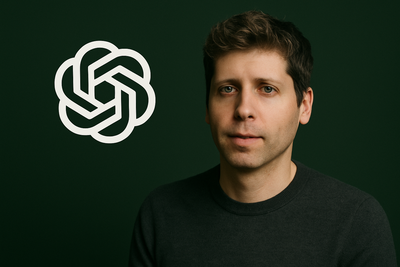ARTICLE AD BOX

In a recent interview with Cleo Abram titled "Sam Altman Shows Me GPT-5... And What’s Next", Sam Altman, the chief executive officer (CEO) of OpenAI, shared a striking perspective about the future facing today’s college graduates.
With artificial intelligence (AI) rapidly evolving and transforming industries, the looming question for many young students is what the job market will look like when they enter the workforce.
In the interview, it was mentioned that reports indicate AI could replace nearly half of entry-level white-collar jobs within five years. Yet, Altman offers an optimistic viewpoint, describing this generation of graduates as possibly the luckiest in history.
Sam Altman Shows Me GPT 5... And What's Next
AI and the changing landscape of work
The landscape of work is undeniably changing. AI systems are automating routine tasks across sectors such as finance, customer service, and even creative industries. For students graduating today, this forecast suggests a future different from that of previous generations.However, history shows that technological advancements often lead to the disappearance of some roles but simultaneously create new jobs, industries, and fields of study.
The crucial factor for success lies in adaptability and willingness to learn new skills. Altman recognises this reality but highlights that young people are inherently better equipped to navigate such transitions.
Careers beyond imagination
During the interview, Altman imagined the distant future of 2035, describing a world where college graduates might be embarking on extraordinary careers beyond current comprehension. “What are the things that we could look ahead if we’re thinking about in 2035 that like graduating college students, if they still go to college at all, could very well be like leaving on a mission to explore the solar system on a spaceship in some kind of completely new exciting, super well-paid, super interesting job.
I'm feeling so bad for you and I that we had to do this kind of like really boring old kind of work and everything is just better,” he said.This vision reflects a shift from the traditional work paradigm to one where innovation and exploration become central. For many students, the jobs they will pursue may not even exist yet. This uncertainty can be daunting, but it also offers a landscape rich with possibility.
Empowerment through AI tools and entrepreneurship
Closer to the present, Altman points out how AI has dramatically lowered the barriers to entrepreneurship and creation.
“I think it is probably possible now to start a company that is a one-person company that will go on to be worth like more than a billion dollars and more importantly than that deliver an amazing product and service to the world and that is like a crazy thing,” he noted. The accessibility of AI-powered tools means that tasks once requiring hundreds of employees can now be achieved by a single individual with the right expertise and creativity.For students in 2025, this means the conventional pathways to success are evolving. Learning how to leverage AI tools, whether for software development, content creation, data analysis, or other domains, is becoming a critical skill. Universities and educational institutions are increasingly integrating AI literacy and digital fluency into their curricula. This equips students not only to find jobs but also to create them.
The importance of adaptability and lifelong learning
Altman’s concern is less about the young graduate and more about those in later stages of their careers who may resist change. “I’m more worried about what it means, not for the like 22-year-old, but for the 62-year-old that doesn’t want to go retrain or reskill,” he mentioned. This distinction underlines the urgency for lifelong learning and flexibility in career planning.Despite fears of disruption, Altman’s message to students is clear: This is a remarkable time to be entering the workforce.
The tools available today allow for creativity and impact on a scale never before possible. The future will require a new kind of literacy that combines technical knowledge, adaptability, and an entrepreneurial mindset.
Preparing for a transformative era
In 2025, students looking ahead should take note of these insights. The traditional model of graduating and moving directly into a stable, entry-level position may be rare. Instead, many may find themselves pursuing portfolios of projects, starting ventures, or collaborating with AI systems to generate value.
The skills to navigate this new ecosystem include problem-solving, critical thinking, and digital competence.The coming decade will be one of rapid transformation. AI-driven innovation will disrupt but also empower. Altman’s perspective encourages students to embrace this change and seize the unique opportunities it presents.For students who are open to exploring new domains and learning continuously, the future holds the promise of meaningful, well-paid, and exciting work.
Whether this means joining space exploration efforts, creating pioneering technologies, or launching solo startups worth billions, the AI era is shaping a workforce that is as dynamic as it is unprecedented.Sam Altman’s reflections, grounded in his leadership role at OpenAI, remind us that despite uncertainties, young graduates today truly are the luckiest in history. They stand at the threshold of a future where human ingenuity combined with AI can redefine the limits of possibility.TOI Education is on WhatsApp now. Follow us here.



.png)
.png)
.png)
















 1 hour ago
3
1 hour ago
3









 English (US) ·
English (US) ·